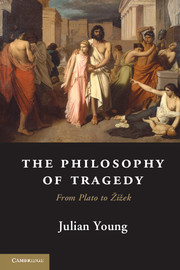Book contents
2 - Aristotle
Published online by Cambridge University Press: 05 June 2013
Summary
Aristotle (384–322 BCE), son of the court physician to the King of Macedon, moved to Athens at the age of seventeen to join Plato’s Academy, first as a student and then as a teacher. He remained there almost until the time of Plato’s death. His (incomplete) Poetics is the first treatise ever to be devoted in its entirety to the philosophy of literature. It is a work, as Kierkegaard accurately notes, of deep ‘interiority and quiet absorption’ – there is a great deal more going on than is apparent from its dry, almost botanical surface. After its rediscovery in about 1500 it exercised a powerful influence over dramatists, critics and theorists, an influence that persists to the present day. Even figures as contemporary as Walter Benjamin and Arthur Miller, we shall see, find it necessary to engage with Aristotle. There seems to be no doubt that the Poetics was intended by Plato’s most gifted pupil as a reply to his teacher, as a defence of poetry in the face of the Republic’s critique. It may even be that the slight softening in Plato’s attitude to tragedy we noted in the Laws, written at the end of his life, was a result of his acquaintance with the Aristotelian defence. I shall begin by discussing those parts of the Poetics that represent a response to Plato’s ‘painting argument’ before moving on to those that respond to the ‘stiff-upper-lip argument’.
MIMESIS
Tragedy, poetry in general, the Poetics begins by observing, is a kind of mimesis, a copying or representing (1447a 14–27). Thus far Aristotle agrees with Plato’s analogy between poetry and painting. Both art forms represent things other than themselves. From childhood on, he continues, human beings differ from all ‘other animals’ in taking a natural delight in creating and viewing representations. Even when the object of representation is something, such as a fierce animal, ‘whose sight causes us pain’ we still take delight in its image.
- Type
- Chapter
- Information
- The Philosophy of TragedyFrom Plato to Žižek, pp. 21 - 40Publisher: Cambridge University PressPrint publication year: 2013

